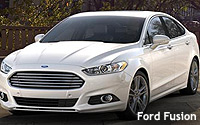Ford, Jeep, Chevy Top Digital Auto Brands
- by Mark Walsh @markfwal, May 17, 2013
 On the digital proving track, Detroit is beating out the competition. Ford, Jeep and Chevrolet were the top three auto brands based on an analysis of
their Web site, digital marketing, social media and mobile efforts over the last year.
On the digital proving track, Detroit is beating out the competition. Ford, Jeep and Chevrolet were the top three auto brands based on an analysis of
their Web site, digital marketing, social media and mobile efforts over the last year.
Each of the 42 brands assessed in the "L2 Digital IQ Index: Auto" study was scored against more
than 350 qualitative and quantitative data points and assigned a Digital IQ ranking of Genius, Gifted, Average, Challenged or Feeble. Web site marketing is given the most weighting at 35%, and
social media, the least at 15%.
Only Ford earned a “Genius” rating, with a score of 142. “Strong digital fundamentals combined with a willingness to experiment set
the brand apart,” stated the report authored by Scott Galloway, L2 founder, and NYU Stern clinical professor of marketing.
In particular, it cited initiatives including
Ford’s connected car platform Sync, iPad catalogs for different models, strong customer support and dealer inventory search via its Web site, and a social media hub through its Ford Social
site.
Jeep was cited for its retargeting efforts to send consumers to a microsite linking to local dealers, and its “Badge of Honor” community for off-road enthusiasts.
Chevrolet received high marks for its active presence on YouTube, including competitive ad purchasing on the video site, as well as segmented email marketing across 24 models.
Among
other auto brands in the “Gifted” category were Toyota, Nissan, BMW, Honda, Cadillac, Chrysler and Mercedes-Benz. Toyota was credited especially for having a strong commitment to mobile
with its touchscreen mobile site, “striking” iPad app and Entune suite of mobile apps and data services for in-car use.
At the other end of the spectrum, the
“Feeble” category was populated by ultra-luxury brands, including Rolls-Royce, Ferrari, Bentley and Lamborghini.
What about Tesla Motors, the electric car startup that has
seen its stock nearly double in the last two weeks after being rated the best car by Consumer Reports since 2007? It fell into the “Challenged’ bucket, given the lack of a mobile
site and low traction on YouTube, among other factors.
Beyond ranking specific brands, the L2 study offered several broader findings about digital efforts in the auto category. For
one, search advertising has gone mobile. Automakers are nearly four times more likely to rely on paid search in mobile than on the desktop, reflecting the desire to reach potential buyers while
they’re out shopping.
In the mobile realm, companies are also doing better work with smartphones than tablets. Nearly nine out of 10 (86%) auto brands had mobile-optimized sites on
smartphones, while almost one in four had missing or broken components on tablet sites. On a third featured touch-and-swipe functionality versus 75% on mobile sites.



It seems that user generated communities and content were not taken into account of what was measured. A brand spending the most and have the largest voice in my opinion does not show they have the most passionate customers. Many other brands have huge enthusiast-run forums and communities as well. With that said, I do give props to Ford, Chevy and Jeep for putting a large priority on the digital spectrum.